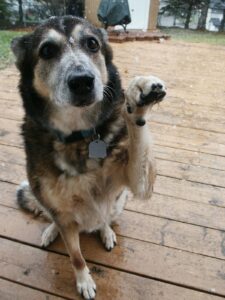Barks Blog
Competition in the Dog Training World: Is It Necessary?

By Joanne Ometz
I am a graduate of Turid Rugaas’ first US offering of her dog behavior counselor/trainer certification course. Most people in the US know Rugaas for her book, On Talking Terms with Dogs, and the study of canine body language is a big part of what I learned. But what is not well known is that she has a full curriculum that she has taught in Europe for many years. Before that, I was the organizer and de-facto teacher for a local dog club where the focus was on fun, and learning skills to enhance our relationships with our dogs. My former professional education was as a social worker.
I am by nature a collaborator and not the most competitive person, and the dog training world took me somewhat by surprise. I expected to find a collegial atmosphere, with trainers sharing their techniques and referring clients to each other. Instead, I have found a surprising amount of competition, which I am finding it a little difficult to understand.
Social workers and other mental health professionals who are in private practice routinely refer clients to each other. This may be because of a lack of space in their schedule, or because they know a colleague specializes in something they do not. Or it may simply be because they, or the client, believe a colleague would be a better fit.
I have not seen this so much in the dog training world. For instance, often, if we work for another trainer or a facility, we sign a ‘no-compete’ agreement. As such, I have heard of one trainer who put up fliers several days short of the no-compete contract’s full year who was ordered to take them down by his former employer.
Are we that threatened by each other, or that unsure of our own abilities that we are unable to welcome more great trainers in to the fold? Are there so few people who own dogs that we have to guard our resources so aggressively? How much do we miss out on by behaving this way? And how much could we benefit by becoming more cooperative, more of a community?
This is not just a theme in the world of dog trainers. There is a phrase, “It’s a dog eat dog world.” But we now know how cooperative dogs are in their dealings with each other. Sometimes I wonder if ‘dominance theory’ has more to do with humans than dogs!
There are oases in this emotional desert but they are few and far between. There are many workshops, books and journal articles on how to compete more effectively against each other. But it is less common to come across education that deals with how best to collaborate and work together for our common goals (although this is something PPG is working to change). And so often, generosity and cooperation, just like competition and aggression, breed more of the same. These values take effort and awareness in order to instill them in ourselves and in our relationships. We work to improve the lives of animals that love and support us more than any other. Can we not learn from them how to relate more peacefully with our own kind?
Joanne Ometz is a dog behavior counselor/trainer located in Asheville, NC. When not working with clients or volunteering at the Asheville Humane Society, she spends time with her Aussie puppy Frida, mixed breed Sadie, Queen Lorraine the cat, and various human friends. She can be reached via her website.

